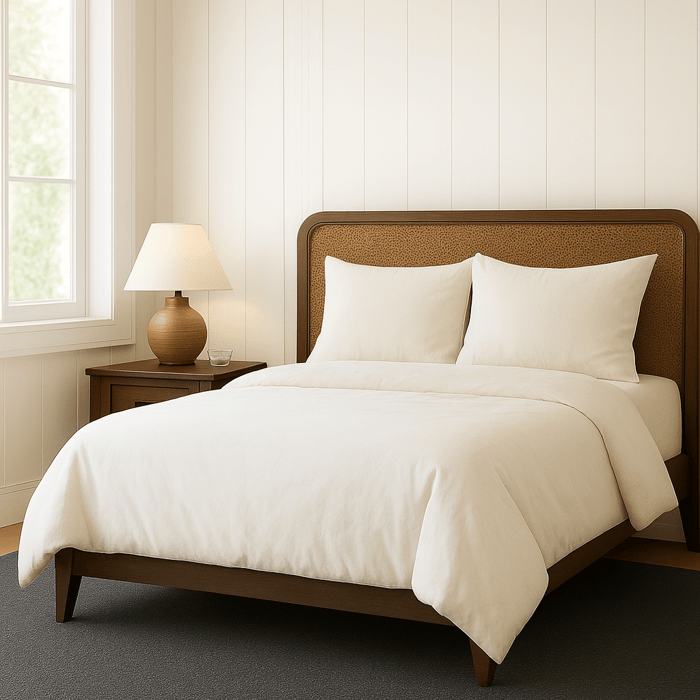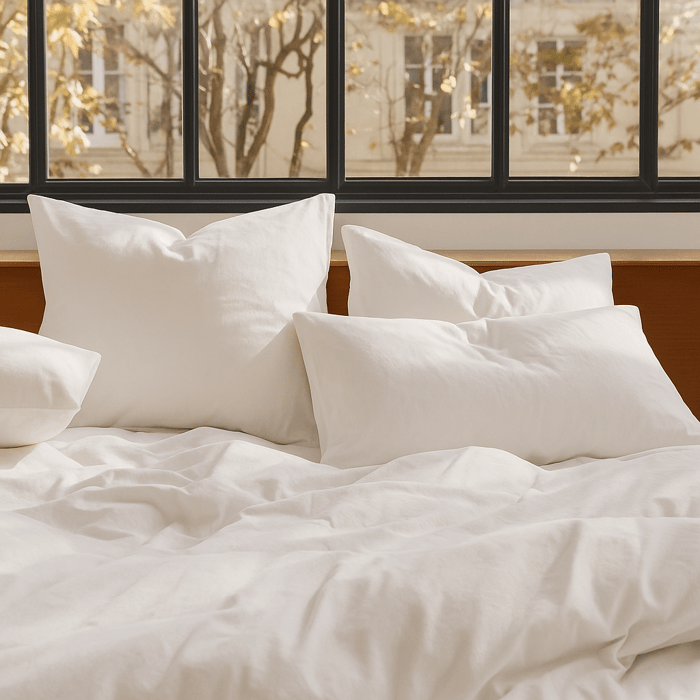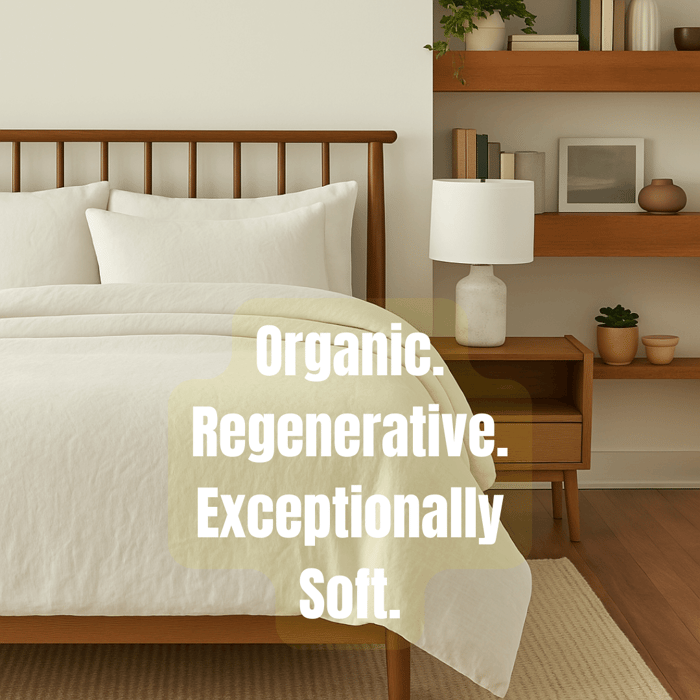Table of Contents
- Looking For Wool Bedding For Deeper Sleep? Learn How Natural Bedding Changes Your Brain and Body
- Why Sleep Isn’t Just About Hours — It’s About Depth
- How Natural Wool Bedding Improves Sleep Quality
- The Science: How Bedding Impacts Sleep Physiology
- The Problem With Synthetics
- Why Wool Bedding Is Different
- Regenerative Wool Makes It Even Better
- What Customers Are Saying:
- Natural Wool Bedding | Antipodean Home | Made in New Zealand
- What to Look for in Sleep-Enhancing Bedding
- The Bottom Line
- FAQs
Looking For Wool Bedding For Deeper Sleep? Learn How Natural Bedding Changes Your Brain and Body
Synthetic sheets or "down alternative" might be sabotaging your sleep — especially if you're not using wool bedding for deeper sleep.
They might feel silky at first touch — but they’re not doing your nervous system any favors. If you’ve been tossing, turning, waking up hot (then cold), or waking up tired despite 8 hours in bed, your bedding could be part of the problem.
Here’s what the science says: the materials closest to your skin at night play a major role in your core temperature, nervous system activity, and sleep depth. And when it comes to better sleep, natural wins every time.
Whether you call it wool bedding, a wool comforter, or a natural duvet, the right materials can transform how you sleep. Unlike synthetic comforters that trap heat, organic wool bedding regulates temperature and keeps your body in balance — helping you reach the deep, restorative stages of sleep faster.
Why Sleep Isn’t Just About Hours — It’s About Depth
We tend to track sleep like a timecard. But what really matters is how deeply you sleep. Deep sleep is when your body does most of its recovery — repairing tissues, balancing hormones, and consolidating memory.
Shallow, fragmented sleep (which is increasingly common in people using synthetic bedding) can leave you waking up groggy and foggy, even after a full night.
That’s why so many people are turning to wool bedding for deeper sleep — because it works with your body, not against it.
 Natural Wool Bedding | Antipodean Home | Made in New Zealand
Natural Wool Bedding | Antipodean Home | Made in New ZealandHow Natural Wool Bedding Improves Sleep Quality
Studies show that breathable, temperature-regulating bedding — especially made from organic wool — helps maintain optimal core body temperature, promoting REM cycles and balanced circadian rhythm.
Using an organic comforter filled with natural wool enhances this effect, helping your body stay in its ideal temperature zone through the night.
The Science: How Bedding Impacts Sleep Physiology
Let’s break down three measurable ways natural bedding — especially wool — influences the quality of your rest:
1. Core Temperature Regulation
Our bodies follow a natural rhythm of cooling down before and during sleep. Wool’s unique structure helps maintain a steady thermal balance by pulling heat and moisture away from your skin when you start to warm up — without leaving you chilled. This helps you fall asleep faster and stay asleep longer.
One study from the University of Sydney found that people sleeping in wool bedding fell asleep faster and had longer periods of deep sleep compared to those using synthetic alternatives.
This is why temperature regulating bedding — especially made with wool — is increasingly recommended by sleep experts.
2. Heart Rate Variability (HRV)
Heart rate variability is a marker of nervous system balance and sleep quality. Higher HRV during sleep is associated with better recovery and reduced stress.
Sleeping in breathable, non-toxic natural fibers like wool reduces thermal and chemical stress on the body, which helps improve HRV. That means your body rests more efficiently, and your sleep becomes restorative — not just unconscious.
Wool bedding for deeper sleep helps your heart and nervous system sync up so you wake up feeling more refreshed.
3. Circadian Rhythm Support
Your circadian rhythm governs everything from hormone cycles to temperature regulation and brain detox. Materials that trap heat, like polyester, confuse your body’s natural signals. Wool bedding, on the other hand, helps reinforce your body’s cooling signals that trigger melatonin production and signal it’s time for rest.
In short: natural, temperature regulating bedding helps you get into deep sleep — and stay there.
The Problem With Synthetics
Most conventional bedding is made from petroleum-based synthetics like polyester or microfiber. These materials trap heat and moisture, block airflow, and off-gas chemicals that may irritate skin or disrupt hormonal balance.
While they can feel smooth initially, they lack the responsive properties of natural materials. They overheat you, then chill you, then wake you — all without you fully realizing it.
Add to that the environmental cost and they become even harder to sleep on, metaphorically speaking.
“Merino wool bedding and sleepwear supported more stable heart-rate variability and reduced nighttime awakenings.”
— University of Sydney & AgResearch collaborative study on wool and sleep physiologyWhy Wool Bedding Is Different
Wool is not just breathable — it’s actively temperature-regulating. Unlike cotton (which can absorb moisture and stay damp) or synthetics (which trap it), wool wicks away moisture and allows it to evaporate — helping keep your skin dry and temperature steady.
 Natural Wool Bedding | Antipodean Home | Made in New Zealand
Natural Wool Bedding | Antipodean Home | Made in New ZealandKey Benefits of Wool Bedding for Deeper Sleep:
Improves thermal comfort through responsive airflow
Reduces skin irritation with hypoallergenic, chemical-free fibers
Lowers humidity and sweat for consistent REM cycles
Supports nervous system recovery via calmer core temperature transitions
Reinforces circadian cycles for consistent sleep/wake rhythms
Plus, wool is naturally resistant to dust mites and mold — common disruptors for people with allergies or asthma.
“Participants wearing wool sleepwear fell asleep faster and experienced longer periods of deep sleep compared with cotton or polyester.”
— University of Sydney Sleep Research Centre, peer-reviewed study on sleepwear fiber typeRegenerative Wool Makes It Even Better
At Antipodean Home, we go beyond organic. Our wool comforters are made from certified regenerative wool sourced from low-impact farms across New Zealand. Why does that matter?
Because regenerative farming produces wool that’s not just sustainable, but richer in natural lanolin, softer in texture, and produced without the use of synthetic pesticides or fertilizers — all of which can impact sensitive sleepers.
And with our signature Airlay™ design, the wool is formed into light, fluffy spheres that promote even greater airflow — making it perfect for temperature regulating bedding in every season.
Our regenerative wool bedding is the ideal choice for deeper sleep, no matter the season. In fact, our wool is sourced from ZQ-certified regenerative farms across New Zealand — where soil health and biodiversity come first.
Explore how regenerative farming supports deeper sleep →
Organic Wool Comforter

$342.00
$380.00
Our organic wool comforter is designed to keep you dry, balanced, and deeply comfortable all night. Unlike down or synthetic comforters that trap heat, our spun wool design wicks away moisture and prevents overheating, so you stay cool & dry.… Read more
What Customers Are Saying:
“I didn’t realize how much my old sheets were affecting me until I switched to wool. It’s like my body finally relaxes at night.” – Harper, CA
“No more waking up at 3am drenched. This comforter regulates everything.” – Kim, OR
“I track my sleep with a wearable — and I’ve literally seen my deep sleep double since switching.” – David, AZ
 Natural Wool Bedding | Antipodean Home | Made in New Zealand
Natural Wool Bedding | Antipodean Home | Made in New Zealand
 Natural Wool Bedding | Antipodean Home | Made in New Zealand
Natural Wool Bedding | Antipodean Home | Made in New ZealandWhat to Look for in Sleep-Enhancing Bedding
If you’re ready to make the switch, here’s what to prioritize:
✅ Wool bedding for deeper sleep (especially with Airlay or lofted structure)
✅ GOTS-certified cotton covers (organic, breathable, gentle on skin)
✅ Chemical-free comforters and bedding. No synthetics, microfibers, or chemical finishes
✅ Sustainably and regeneratively sourced for long-term impact
✅ Natural bedding for allergies and sensitive skin
When shopping for the best wool comforter for hot sleepers, look for breathable, chemical-free bedding made with organic wool and cotton. Avoid synthetic blends that block airflow or contain microplastics.
💤 “Sleepers using wool bedding spent 25% more time in deep sleep compared to those using synthetic fibers.” — University of Sydney Sleep Research StudyThe Bottom Line
Better sleep starts with better bedding. And wool bedding for deeper sleep is the answer. And not just softer or fluffier — but bedding that works with your body to support recovery, deep rest, and long-term wellness.
Our regenerative wool comforter is designed with this exact science in mind — from the farm to your bed. Because deeper sleep means brighter days.
Ready to feel the difference?
Ready to upgrade your sleep from the inside out?
FAQs on Wool Duvet Inserts, Comforters & Sustainable Bedding
Is wool bedding good for hot sleepers?
Yes — wool bedding naturally regulates temperature, keeping you cool when it’s warm and warm when it’s cool. Unlike synthetic or down comforters that trap heat, wool fibers wick away moisture and allow airflow. This makes it one of the best options for hot sleepers and night-sweat sufferers.
Can wool comforters help night sweats?
Absolutely. Wool’s ability to absorb and release moisture prevents sweat build-up during the night. It draws humidity away from your body, keeping your skin dry and your temperature stable. That’s why organic wool comforters are recommended for people with night sweats or hormonal temperature swings.
What’s the difference between wool and down comforters?
Down comforters insulate by trapping heat, while wool comforters regulate it. Wool bedding adapts to your body’s needs — keeping you in the optimal sleep zone without overheating. Plus, wool is hypoallergenic, moisture-wicking, and sustainable, whereas down can trigger allergies and lose loft over time.
How long does a wool comforter last?
A high-quality organic wool comforter can last 10 to 15 years (or longer) with proper care. Its natural resilience means it resists clumping and retains its loft over time. Regular airing and spot cleaning are usually enough to keep it fresh — no dry cleaning or replacement every few seasons needed.
Is wool hypoallergenic?
Yes — organic wool is naturally hypoallergenic. Its fibers resist dust mites, mold, and bacteria, which are common triggers for allergies. Unlike synthetic bedding treated with chemicals, regenerative wool bedding stays fresh and clean without additives, making it ideal for sensitive skin and allergy-prone sleepers.
Why is wool naturally hypoallergenic?
Wool’s structure does the work for you. Each fiber has a waxy coating called lanolin, which repels dust mites and bacteria. The fibers also absorb and release moisture, keeping your bedding too dry for allergens to thrive. Unlike synthetics, wool doesn’t hold onto odors or micro-particles — making organic wool comforters a clean, non-toxic choice for sensitive sleepers.




